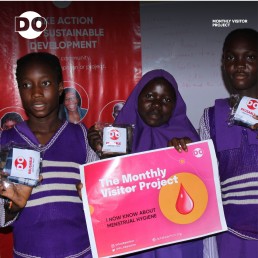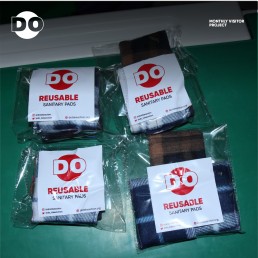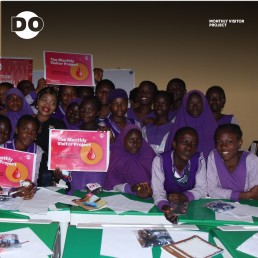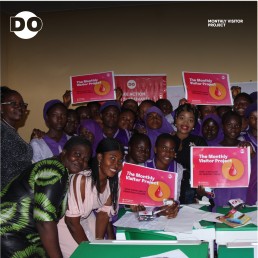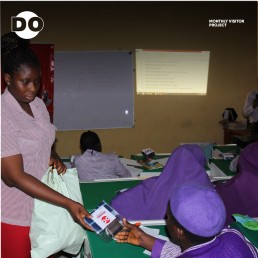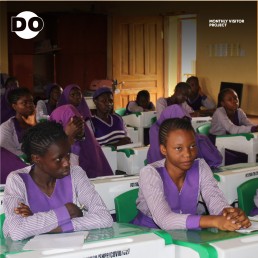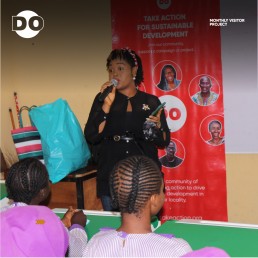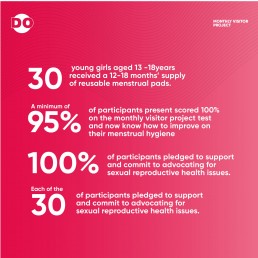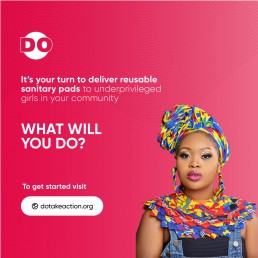GDC IN ACTION
Promise Nzubechukwu Ubanatu sensitises and teaches 30 girls at Jikwoyi Model Secondary School (JMSS), Dagbana, menstrual hygiene and reusable pad production, and empowers 30 underprivileged girls with 90 reusable pads
Location | Dagbana, Abuja, Nigeria
Share this project
THE NEED
Girls all over the world are still approaching puberty without the knowledge, tools, and support they require to grow up confident. Every day, approximately 800 million women and girls experience menstruation; however, one-third of this population lacks access to clean water, hygiene facilities, and sanitary materials to manage menstruation with dignity. Unfortunately, a lack of access to these necessities leads to poor menstrual hygiene practices among women and girls.
From schools to businesses to religious groups, a number of women and girls face the terrible reality of being unable to manage their periods owing to a lack of access to water, sanitation, and hygiene facilities, which is typical in many low- and middle-income nations, including Nigeria. Due to exorbitant costs, nearly 37 million Nigerian teenage girls and women of reproductive age do not have access to menstrual hygiene products. This lack of access to period products is sometimes referred to as “period poverty,” and the global incidence of it is underappreciated.
Sanitary pads cost an average of $1.30 each pack, whereas many families live below the poverty line of $1.20 per day. According to a recent World Poverty Report, around 86 million Nigerians live in extreme poverty. The high cost of sanitary pads in Nigeria has made them difficult to obtain for underprivileged girls and women living in rural areas. Many women use unhealthy menstrual practices and materials, which leads to reproductive tract infections (RTIs) and death.
It is against this backdrop that Promise Nzubechukwu Ubanatu stepped up to change the narrative. She organised a project titled “The Monthly Visitor” under the DO-Take Action umbrella, to sensitise women and girls in her community on safe menstrual practices, and donate some pads to the underprivileged.
25-year-old Promise is a graduate of Biotechnology from the Federal University of Technology, Owerri. Promise, who is currently working as a beauty advisor and also a Fashionpreneur in Abuja, wants to see people attaining new heights and fulfilling their purpose.
She launched the project under Good Health and Wellbeing program; a DO program that addresses key challenges in the health care sector by carrying out advocacy campaigns, health outreaches, capacity building workshops and community infrastructure projects that will ultimately improve the quality of health care and impact at least 10 million Nigerians over the next 10 years.
Promise carried out the project at Government secondary school in Dagbana, Abuja. The details include the following actions;
- Keynote presentations on menstrual hygiene management and lifestyle, menstrual cycle calculation, reusable pads
- A practical session on how to make reusable pads
- An interactive Q/A session where the participants asked questions and were given informed answers
- Distribution of 90 reusable pads to 30 underprivileged girls (3 pads per girl)
In the course of the project, a minimum of 30 participants (aged 13-18years) were sensitized about menstrual hygiene and how to improve on their menstrual hygiene. A minimum of 95% of participants scored 100% on the monthly visitor project test, learnt how to improve on their menstrual hygiene, learnt how to produce reusable pads, and pledged to support and commit to advocating for sexual reproductive health issues. 30 GDCs were recruited from the participants to organize the Monthly Visitor Project outreach in their community; each girl will reach out to 10 girls and teach them how to make reusable sanitary pads. The creation of an online community was formed, with the consent of the parents of the girls where the participants will receive further tutoring, mentoring and where they can ask any question about menstruation. The crux of the project was when about 90 Reusable Sanitary Pads were distributed to 30 underprivileged girls in Senior Secondary School.
Promise stepped up to the challenge of unhygienic menstrual practices in her community. What action are you taking against the problems you see in your community?
If you enjoyed the story and would like to read more stories like this, sign up for our monthly newsletter to get notified of new stories.
Also, do well to follow our social media handles for more engaging and entertaining content on issues that affect YOU.

